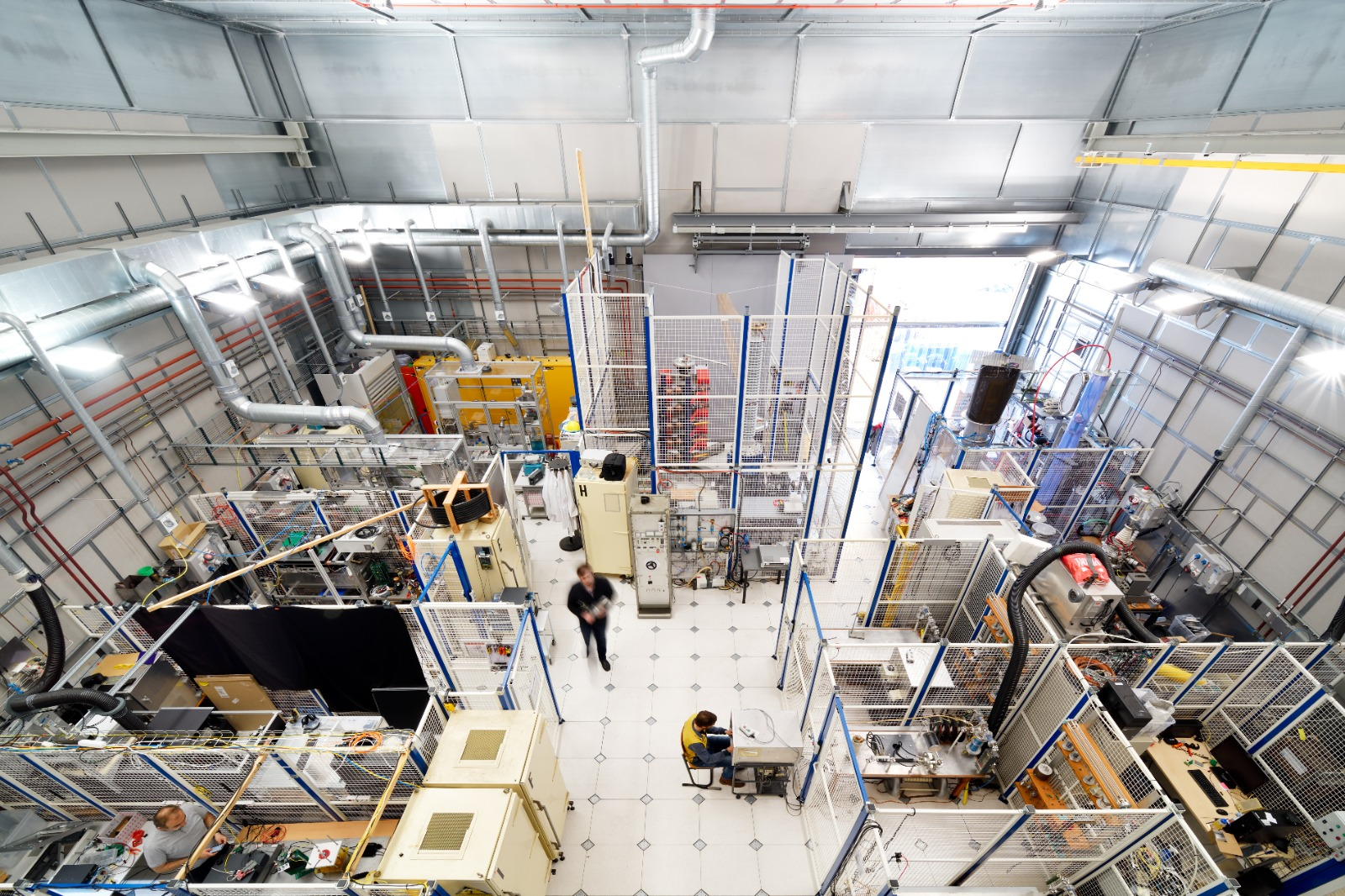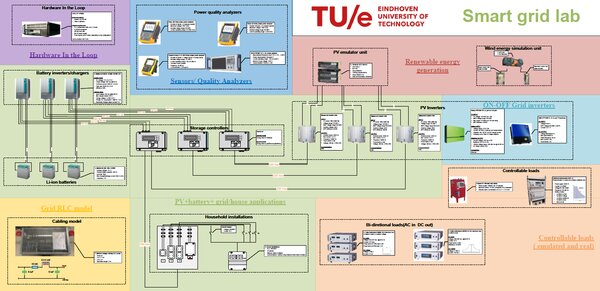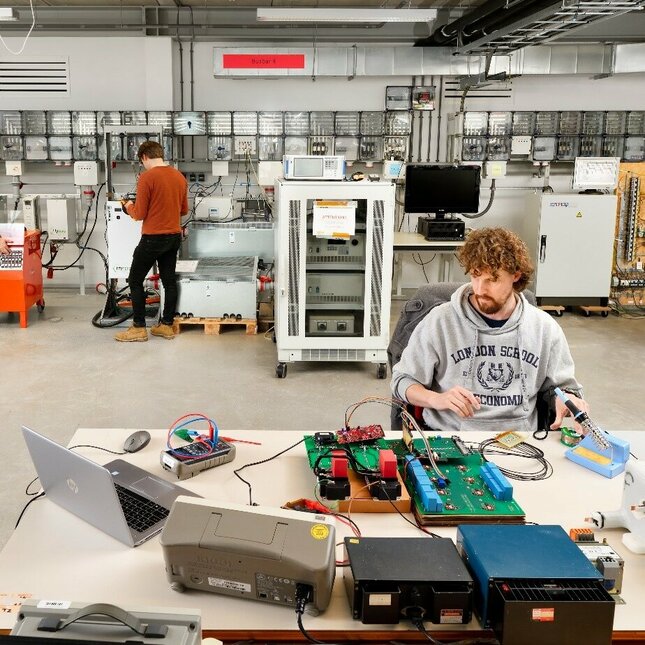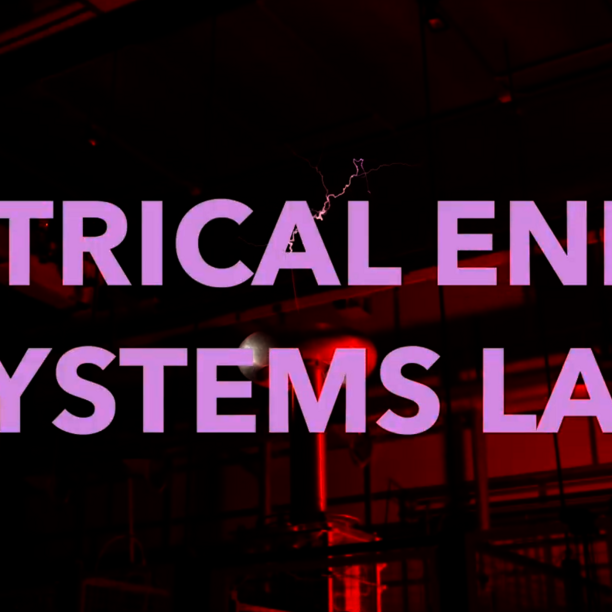Electrical Energy Systems Lab
Welcome to the Electrical Energy Systems laboratory of the EES group at TU/e. Our advanced laboratories facilitate our transformative journey to power our future with clean, reliable, and efficient electricity. The Electrical Energy Systems laboratory consists of a high-voltage lab, a smart-grid, a lab on electromagnetic compatibility and the Eindhoven Grid lab.
The EES High-Voltage laboratory

The High-Voltage laboratory of TU/e-EES consists of a shielded Faraday cage (14 m wide x 14 m deep x 8 m high), which allows for electromagnetic disturbance free operation of the various experimental setups. It has a flexible infrastructure, such as modular work spaces, which each feature a wall-integrated gas supply for technical gases, as well as a dedicated power supply with various connections behind safety interlocks operated from the doors of the work spaces.
A wide range of high-voltage (pulse) sources are available (voltage levels up to 500 kV, DC, AC up to <1 ns duration pulsed) and related electrical diagnostics with bandwidths of over 4 GHz. Available diagnostics are: high voltage sensors (up to several GHz), current probes (up to 1 GHz), fast sampling oscilloscopes (up to 3 GHz), fast iCCD camera’s (200 ps time resolution), spectrometers, gas analysis diagnostics (GC-FIDMS, GC-TCDFID, FTIR-MCT), liquid phase diagnostics (UV-VIS absorption spectrometer, pH-ORP station), plasma diagnostics (Optical Emission Spectroscopy), dedicated plasma reactors and excellent gas delivery systems. BEM/FEM software and expertise is available for 3D EM-field calculations. In addition, the lab has an electronics and mechanical workshop and an outdoor experimentation area.
The EES Smart Grid laboratory

At our cutting-edge Smart Grid Lab, we provide a state-of-the-art facility for research, development, and testing of advanced energy management systems and technologies. Our lab is equipped with a diverse range of specialized equipment and tools that enable comprehensive analysis and experimentation in the field of smart grids and renewable energy integration.
Key Equipment in our Smart Grid Lab:
- Hardware-in-the-Loop (HIL) System: Our HIL system allows us to simulate and test real-world scenarios by integrating physical hardware components with advanced computer simulations. This enables us to evaluate the performance of various smart grid technologies in a controlled environment.
- Power Quality Analyzers: We utilize high-precision power quality analyzers to monitor and analyze electrical parameters such as voltage, current, harmonics, and transients. These instruments help us assess the quality and stability of power systems, ensuring reliable and efficient energy delivery.
- Batteries and Storage Controllers: Our lab features a range of batteries and storage controllers for studying energy storage technologies, their performance, and their integration into smart grids. This enables us to explore advanced energy management strategies, peak shaving, and grid stabilization techniques.
- PV Inverters and PV Emulator Units: We have a comprehensive collection of photovoltaic (PV) inverters and emulator units, which allow us to investigate the behavior, efficiency, and grid integration of solar power systems. This helps us optimize the performance of PV installations and explore their potential impact on the grid.
- Wind Emulator Units: Our wind emulator units simulate wind turbine behavior and allow us to analyze the impact of wind power on the grid. By emulating different wind conditions, we can assess the performance and stability of wind power integration and develop control strategies for wind farms.
- Smart Inverters for On and Off-Grid Applications: We have a range of smart inverters capable of operating in both grid-tied and off-grid modes. These inverters facilitate the integration of renewable energy sources, such as solar and wind, into the grid and enable the implementation of microgrids and islanding operations.
- Controllable Loads: Our lab includes a combination of emulated and real controllable loads. These loads can be dynamically controlled to simulate different energy demand scenarios and evaluate the response of the grid and renewable energy systems. This helps us develop load management strategies and assess the impact of demand response programs.
- AC and DC Bi-Directional Loads: We have AC and DC bi-directional loads to study the interaction between various types of loads and the grid. These loads allow us to analyze energy flow, power quality, and grid stability under different operating conditions, such as bidirectional power flow and vehicle-to-grid applications.
- Smart House Installations: Our lab features fully equipped smart house installations that showcase the integration of energy management systems with home automation technologies. This enables us to evaluate the efficiency and effectiveness of smart grids in a residential setting and explore innovative energy-saving solutions.

You may find below some smart grid applications that our researchers are working on:
- Grid Integration of Renewable Energy: The lab enables research on the seamless integration of renewable energy sources like solar and wind power into the grid. This involves studying grid stability, power quality, and control strategies for effective integration and optimal utilization of renewable resources.
- Energy Storage Technologies: The lab provides a platform for investigating and optimizing energy storage technologies, such as batteries and storage controllers. Researchers can explore energy management strategies, grid support functions, and the impact of storage systems on grid resilience and stability.
- Power Quality and Grid Stability: Researchers can analyze power quality issues, such as harmonics, transients, and voltage fluctuations, and develop mitigation techniques. The lab facilitates studying the impact of distributed energy resources on grid stability and evaluating control strategies for maintaining reliable power supply.
- Demand Response and Load Management: The lab allows for the development and evaluation of demand response programs and load management strategies. Researchers can analyze the impact of controllable loads, smart house installations, and grid-responsive devices on overall system efficiency, demand-side management, and peak load reduction.
- Microgrid and Islanding Operations: Researchers can design and test microgrid systems using the lab's smart inverters, energy storage technologies, and controllable loads. This includes studying islanding operations, grid-to-island transitions, and microgrid control strategies for enhancing energy resilience and grid-independent operations.
- Advanced Grid Control and Communication: The lab offers a platform for developing and testing advanced control and communication systems for smart grids. This includes research on distributed control algorithms, grid optimization, real-time monitoring, and secure communication protocols to enable reliable and efficient grid operation.
- Energy Management in Smart Homes: Researchers can explore energy management strategies within smart home installations. of multi-carrier energy systems into residential settings. They can explore energy management techniques, load scheduling algorithms, and demand response strategies to optimize energy usage within smart homes. This involves integrating energy systems with home automation technologies, developing energy-efficient algorithms, and evaluating the impact of smart home devices on energy consumption and grid interactions.
- Grid-Electric Vehicle Integration: The lab facilitates research on the integration of electric vehicles (EVs) into the grid. Researchers can study vehicle-to-grid (V2G) interactions, charging infrastructure optimization, and EV-grid coordination for efficient utilization of EVs as flexible grid assets.
- Grid Resilience and Security: The lab provides a testing ground for assessing grid resilience and security in the face of cyber threats and natural disasters. Researchers can explore vulnerability analysis, grid restoration techniques, and smart grid architectures that enhance system reliability and protect against potential disruptions.
The Eindhoven Grid lab
The Eindhoven Grid Lab of TU/e is currently under construction The laboratory infrastructure enables research on Medium Voltage (MV) Power Conversion technologies, systems and applications. The laboratory is a joint infrastructure of our EES group, the group Electromechanics and Power Electronics (EPE) and the Control System (CS) group of the EE department of TU/e.
MV capability is a 'ticket to play' in emerging areas of multidisciplinary research surrounding grid decarbonization: renewable energy integration, e-mobility, energy efficient MV motion, grid operational flexibility, green hydrogen and others.
The lab aims at a power range of 200kW. Medium voltage of 1-22 kV is available via a step-up transformer in three controlled and fenced test bays. The lab setup will be flexible, multipurpose, and versatile – easy to adapt to new needs
Contact us
Electrical Energy Systems
Prof. Dr. Guus Pemen, A.J.M. Pemen, tel. 040- 2474492
